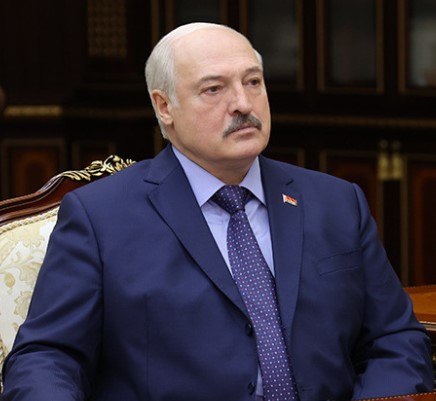Unjustified mediation not only accumulates criminal funds, but also poses a serious threat to national security

On November 14, at the Palace of Independence , President of Belarus Alexander Lukashenko spoke about the discovery of criminal schemes in the dairy industry. It should be noted that the problem of unreasonable mediation has been raised more than once by the head of state. With almost every appointment of heads of iconic enterprises and representatives of the vertical, Alexander Lukashenko placed special emphasis on this problem.
A couple of years ago, the State Control Committee estimated the lost profits from unjustified intermediation at up to 3% of GDP. If we translate this into monetary equivalent, then more than $1.5 billion ends up in the pockets of various types of businessmen every year. From all points of view, the amount is not small.
There are intermediary links in any economy, and in certain situations one cannot do without them. Especially in international trade. Potentially, international production capacity today is several times higher not only than demand, but also the real needs of the entire population of the planet. And since it is sometimes more difficult to sell a product or service than to produce it, world practice has developed an extensive and multidisciplinary structure of sales and logistics.
But domestic realities have their own specifics. Belarus is a relatively small country in the global market with a significant share of state ownership and management of assets. Which objectively makes it possible to replace a significant part of the so-called market functions with state regulation. Especially in such sensitive sectors as the involvement of intermediary structures in the procurement and sales activities of large domestic business entities or critical imports.
Reference. More than 3 thousand enterprises employing almost 1.2 million workers have a share in the authorized capital (shares) owned by the Republic of Belarus and (or) its administrative-territorial units. Moreover, in half of them, state and local authorities own a 100% stake, and in the remaining ones, as a rule, they act as a participant with a controlling stake. The state, investing resources in the economic activities of such enterprises, is clearly interested in their performance.
In particular, as audits show, most often schemes of unjustified intermediation are tied to bribes received by officials and abuse of official powers. And not the least important place here is occupied by family ties. The latest example from Babushkina Krynka OJSC is evidence of this.
Reference. OJSC "Babushkina Krynka" is a large manufacturer of natural dairy products in the Republic of Belarus. The production resources of the enterprise make it possible to process up to 3000 tons of milk per day, and the raw material zone covers 18 of 21 districts of the Mogilev region. In total, the company produces more than 300 types of products. The company's shares are owned by 6,307 thousand shareholders, including 17 legal entities. The state's share in the authorized capital is 96.76%. The average number of employees is about 2.5 thousand people.
Along with identifying and suppressing corruption crimes, their prevention is of particular importance. The organizational and legal measures taken in the country in recent years are aimed at preventing corruption. First of all, these are changes introduced by Law No. 232-Z of December 30, 2022 “On Amendments to Laws on Anti-Corruption Issues,” which are aimed at improving preventive mechanisms for combating corruption and optimizing interaction in this area.
It should be noted that counteraction to unnecessary sales links is under constant control by the government. Back in 2018, the first version of the Action Plan to eliminate unjustified intermediation in the procurement of goods (works, services) and sales of products was developed and approved. This is a comprehensive document that outlines step-by-step activities for ministries and departments, which must report quarterly on the work done. Moreover, it is not static. In pursuance of the provisions of Law No. 232-Z, others were also introduced into it - both indirect regulation and direct rules establishing restrictions on concluding transactions with intermediaries. In particular, we are talking about the mechanism for approval by higher organizations and property supervision bodies of transactions with intermediaries based on the results of government procurement and procurement at the expense of organizations with a state ownership share of more than 50 percent.
The result, as they say, is obvious. In general, there is a tendency in the economy to reduce the share of purchases through intermediary structures. As a result, the overall level of corruption in the country is decreasing. However, as practice shows, and not only domestic, corruption itself and the fight against it is a permanent process, which is characterized by a high level of latency. And it has not yet been possible to completely eradicate it in any country in the world. But this does not mean that we should give up.
In this part, the main criterion when choosing so-called intermediary partners should always be one - economic feasibility.
When it comes to the main buyers in traditional markets, the purchase of complex equipment, raw materials, components, and consumables, then marketing services know perfectly well all their potential clients and partners, their pricing policy and the effectiveness of cooperation with them. And any new schemes must clearly not only be carefully justified directly at the enterprise, but will also attract additional attention from the competent authorities. This should be clearly understood not only by the head of the enterprise itself, but also by other responsible persons.
But what is most surprising is the fact that intermediaries appear when concluding contracts between Belarusian business entities. Belarus is not such a large country that large enterprises or organizations make their purchases or supplies through intermediaries, who include their own interests in the cost of the transaction. Yes, I repeat, there are exceptions. But these are just exceptions, and they require a separate, more thorough justification and attention to the study of not only the transaction itself, but also the credit history of the intermediary.
This process also requires appropriate professional competencies. If previously unscrupulous transactions took place through so-called local pseudo-entrepreneurial structures, then after they were practically ousted from the Belarusian legal field, the problem of so-called domiciled companies, which are registered outside of Belarus, arose. Today, this is, as a rule, Russia or other partner countries in the EAEU .
Once again, the modern economy is quite complex, with companies of various types operating in it, including intermediary ones. If the appropriate calculations have been made, the market has been studied, and as a result it has become obvious that it is profitable to purchase from an intermediary (it does not matter whether it is a dealer or distributor), and not directly from the manufacturer, no problems arise. Since the enterprise has strong arguments justifying procurement from the intermediary, for any authorities, including regulatory authorities. And the absence in Belarusian legislation of such a concept as “unreasonable mediation”, as well as the absence of any established criteria for its unreasonableness or bad faith, only increases the relevance of both pre-contractual preparation and subsequent monitoring of such a transaction.
Without any doubt, the vast majority of Belarusian officials and managers are professional and principled specialists in their field. The need to make responsible decisions every day, usually involving risk, puts the manager before a difficult choice: either follow a proven path, or choose an innovative path, but associated with the risk of causing material damage to the enterprise, which may entail criminal liability based on abuse of power or official authority. .
In this regard, I would like to dwell on just a few of the many aspects of the work of a modern leader. More precisely, on such concepts as “business risk” and “due diligence of business entities.” The essence of these two terms is that the manager has the right to take risks, which is an integral part of his activities, while at the same time it is assumed that he is law-abiding and acts in the interests of the state and his enterprise.
At the legislative level, the right of a manager to take business risks is quite correctly spelled out. This concept was first spelled out back in 2010 in Directive No. 4 “On the development of entrepreneurial initiative and stimulation of business activity in the Republic of Belarus,” which introduced a new category - “economic (business) risk.” Later, in 2017, Decree No. 7 abolished subsidiary liability in relation to managers in the absence of intentional illegal actions on their part. The Criminal Code is now on the side of the directors. A risk (in accordance with paragraph 2 of Article 39 of the Criminal Code) is recognized as justified, “if the committed acts correspond to modern scientific and technical knowledge and experience, and the set goal could not be achieved by actions not related to the risk. In this case, the person who allowed the risk is justified "expected that it had taken all possible measures to prevent harm to protected interests." At the same time, business risk (clause 2-1 of Article 39 of the Criminal Code) receives a similar status in a situation “when the set goal could have been achieved by non-risky actions (decisions), but with a lower economic result.” Thus, if the head of an enterprise, including one with state participation, makes transactions that initially appear to be economically justified, but which at the stage of their execution caused losses, then this fact itself is not a basis for holding this person liable. The competent authorities must provide justification that there was initial intent on the basis of which the abuse of power or official authority occurred.
Returning to the topic of corruption, one more important component should be noted. Typically, such offenses are easier to prevent than to detect. And so that an honest leader does not become a hostage to a potential corrupt official, it is necessary to create certain conditions, as a result of which the possibility of manipulation in order to facilitate a potential corrupt transaction should be excluded or at least greatly complicated. I will give some of them.
The first is to reduce the possibility of collusion between participants in the procurement procedure and the persons who ensure its implementation. To do this, it is often enough for the manager to distribute responsibilities both between his deputies and the involved specialized specialists. Some of them will determine the subject of procurement and its characteristics, some will directly carry out the procurement procedure. For particularly important purchases, which may initially attract the attention of law enforcement or fiscal authorities, external independent experts can be involved.
Another condition is the personal responsibility of those making decisions on the advisability of certain commercial transactions with documentary evidence of the decisions made. The presence of such documents not only makes it possible to subsequently identify those responsible for the offense, but it is also a serious deterrent for everyone involved in procurement procedures.
The next point is that the determination of the subject of purchase, especially in relation to complex technical goods, as well as the requirements for suppliers, contractors and performers should be entrusted to technical specialists. They are the ones who are able to create a proper description and indicate the necessary characteristics of the product. In the future, they must be present on the competition committee with voting rights.
And lastly, special attention should be paid to the presence at the enterprise of a mechanism for operational recording and appropriate response of responsible persons to complaints or other signals of unlawful actions coming both directly from the procurement participants themselves and from other involved or interested parties.




























































